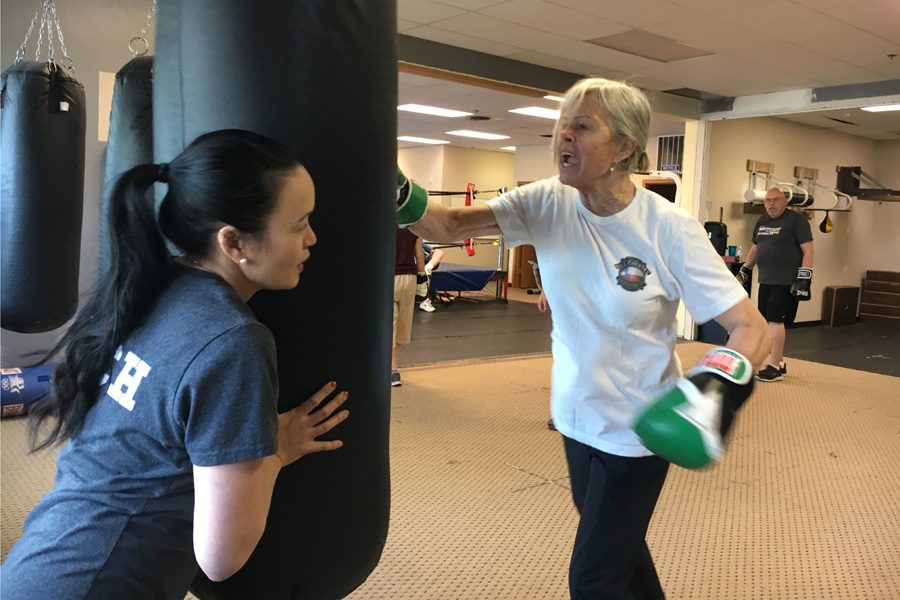Rock Steady Boxing helps Parkinson's patients fight disease

The answer to the obvious question is “no.”
A boxing program for people with Parkinson’s disease does not include a lot of fist-to-face-type action.
Most of the participants already are in a pretty big fight.
Instead, programs like Rock Steady Boxing — a national program offered in the Tri-Cities by Tony and Gigi Valdez at Contenders Boxing Club in Kennewick — use elements of boxing training to work on balance, range of motion, hand-eye coordination and the like.
That’s not to say the punches don’t fly. They just tend to land on a heavy bag or a punching dummy aptly named Parkinson’s Pat.
“I got to hit the (punching mitts), and I felt, ‘Oh my god, this feels so good!’ ” Bill Stevens recalled of his introduction to the program. “It felt like I was fighting my Parkinson’s. I was really, truly fighting my Parkinson’s.”
As valuable as the physical workout is, it’s that sentiment — that they get to fight back — that perhaps is most important.
“They’re fighting a disease, so they can’t give into this,” Gigi said. “Once they get going, it’s kind of a high.”
Contenders offers three classes - one for those who still have most of their mobility, one for those who are severely limited and one for those in between. Each class meets three times a week. The cost is $150 a month, or about $12 a session.
There are “sponsorships” for as many as 10 people, paying up to half of their membership in exchange for being an ambassador of sorts — attending expos and telling people about the program. Word of mouth is how membership climbed from seven when the program first opened just over a year ago to 32 today.
A recent class for the more mobile participants started with them circling up, locking arms and using each leg to “write” the alphabet into the air in front of them. They then broke into two lines across from each other and bounced balls back and forth.
The American Parkinson Disease Association says exercise is critical for fighting off symptoms — tremors, slowed movements and rigid muscles that lead to bad posture and loss of balance — and slowing the effects of the degenerative disease that has no cure.
The Rock Steady participants talk about the “Parkinson’s shuffle,” the slow, measured, slumped walk common to people with the disease who are afraid to take much of a step for fear of falling.
“One member came in doing the Parkinson’s shuffle, and after a couple of months, she was able to do this …” Stevens said, hopping over a couple feet of floor, “... all the way across the floor.”
The gains may not sound like much — being able to walk backward, hop across the floor, etc. But to someone who could barely open the front doors of the gym on a first visit, the value is immeasurable in the fight for confidence and dignity.
“A wife who sits in the chairs (at the side of the gym) came up to me and said her husband put on his pants for the first time in two years,” Gigi said. “Another guy in the class said, ‘I took a bath in the bathtub, and I was able to get out of the bathtub myself.’ ”
As the opening warmup ended, the class formed three lines. The back line did side lunges, the middle “high knee” exercises, and the front started working on the heavy bags. Each participant stood with his or her back to the bag, then proceeded to rain down blows — a barrage of backward, overhead, double-fisted destruction.
Those on the heavy bags wore the biggest smiles.
Stevens and Ingrid Smith were among the original seven in the group. “They can’t get rid of me,” Ingrid laughed.
She said it is encouraging to see the change in herself and in other people, and she remembers what her life was like before she started the program.
“I used to get tired and have to nap all the time,” she said. “Now, I go all day without stopping.”
The physical work is huge, Ingrid said, but so is the attitude that comes from working in a group of people facing the same battle. Improvements instill confidence.
As the class progresses, the participants line up facing a pair of heavy bags. Gigi and Tony grab hold of the bags from the other side and brace for impact as the rotation starts. One after another, the boxers step quickly to the bag and shout “One! Two!” as they deliver a combination, cycling again and again and again through the line.
The punching, Ingrid said, is one of the best parts. She said it’s a way to deal with the latent anger that often accompanies a Parkinson’s diagnosis.
“People come in and say, ‘I can’t do boxing. I can’t do jumping jacks,’ ” Ingrid said, pointing across the gym. “You see that sign on the wall? It says, ‘No whining.’ There is no whining here. You will do it.”
That message – no whining, no feeling sorry for yourself – is best received from someone facing many of the same difficulties. It’s why the social aspect of the group is just as important as the physical.
“The people are the best part of it,” said David Bowles, who sat on the edge of the boxing ring waiting for his class to start. He’s in the session for folks who are less mobile.
Bowles was diagnosed with Parkinson’s about five months ago and has felt a lot of frustration, even with a great support system in place with his wife and two sons, one of whom is a nurse.
“It’s kind of depressing,” he said. “I got Parkinson’s. I got two to three years to live. And the medical doctors don’t seem to have any answers to anything.”
Coming down to the gym, being around others in the same boat, helps, he said. And, he added, his wife has noticed some physical improvements as well.
“They have such great spirit,” Tony said. “They’re all fighting a battle, even if each battle is different.”
Tony and Gigi were on a completely different path two years ago. A married couple with an entrepreneurial spirit, they also flip houses and operate a Facebook management company. Tony has owned Contenders for 12 years, taking it over from the previous owner. Gigi is a licensed physical therapist.
Their combined experience in boxing and physical therapy makes running a Rock Steady program seem a natural fit.
They were asked by Rock Steady back in 2016 if they were interested, and Gigi said there was interest from local Parkinson’s support groups. They weren’t convinced, but inquiries and mentions kept popping up.
“You know when something keeps showing up in your face,” Gigi said. “That was Rock Steady.”
There is a Rock Steady program in Walla Walla, and Tony knows the gym owner. In the summer 2017, they decided to get a firsthand look at the program.
Watching the faces of the boxers and hearing their stories, the couple was — pardon the pun — knocked out.
“Driving home that night, Gigi had booked us the flights, signed us up for training,” Tony said. “She said there was just no way we were not going to do this.”
Soon they were attending a four-day program in Indianapolis — where Rock Steady originated in 2006 — for certification.
Rock Steady’s website touts 40,000 participants and 800 programs around the world, primarily in the U.S. There are an estimated 1 million people in the U.S. living with Parkinson’s. Tony said that includes about 350 in the Tri-Cities.
Along with Tony and Gigi, there are two coaches and up to four volunteers, and they’re always looking for more.
The couple envisions starting up a nonprofit to help pay for the program, with the goal of getting every membership down to $60. The dream would be to start up a sort of center, broadening beyond physical workouts to life skills and education for family and friends.
But whatever happens down the road, Tony said that to him, it’s already a win.
“This is the best part of my day,” he said. “We’re definitely taking another path than we were on and shifting a little bit, but I couldn’t be happier.
“Everyone should be so lucky.”
Rocky Steady Boxing: Contenders Boxing Club, 5601 W. Clearwater Ave., Suite 104, Kennewick; 509-585-8863; rocksteadyboxingtc.com.





